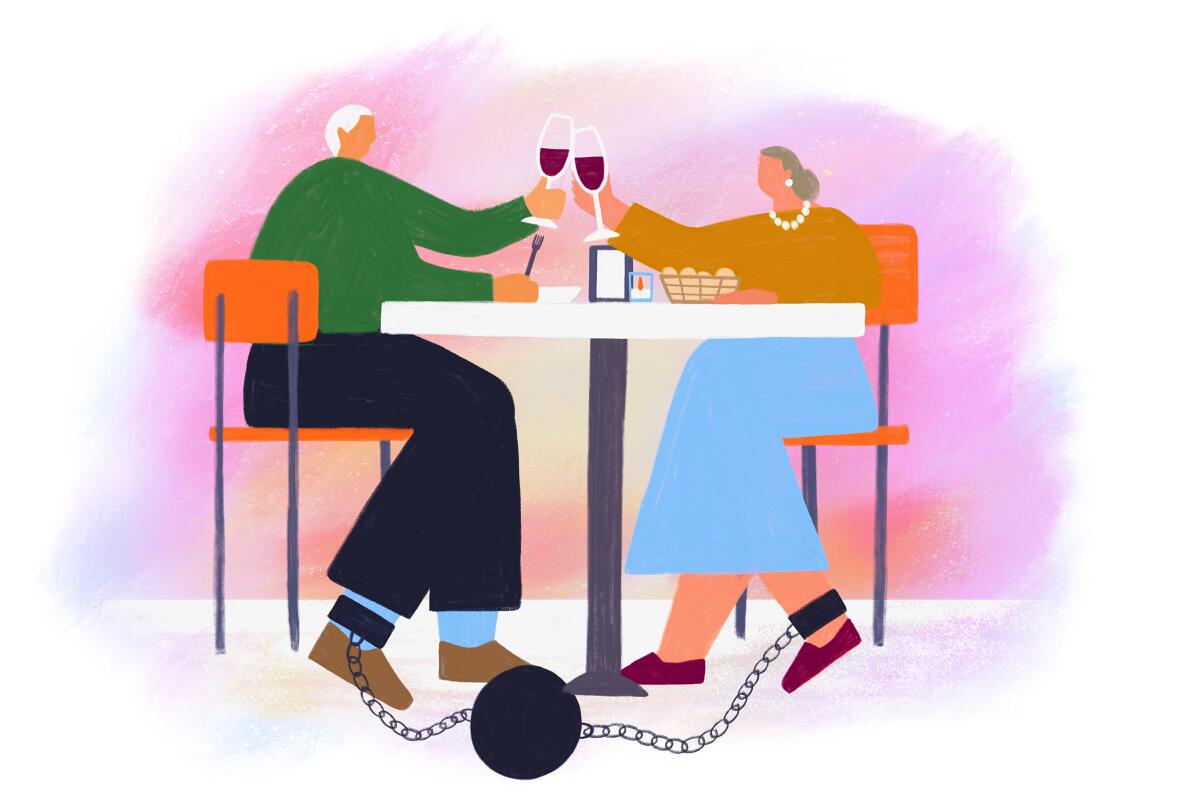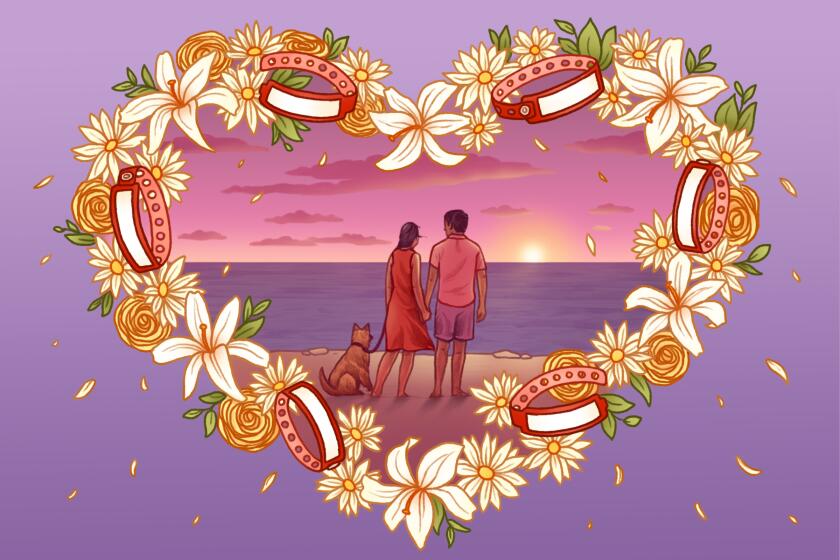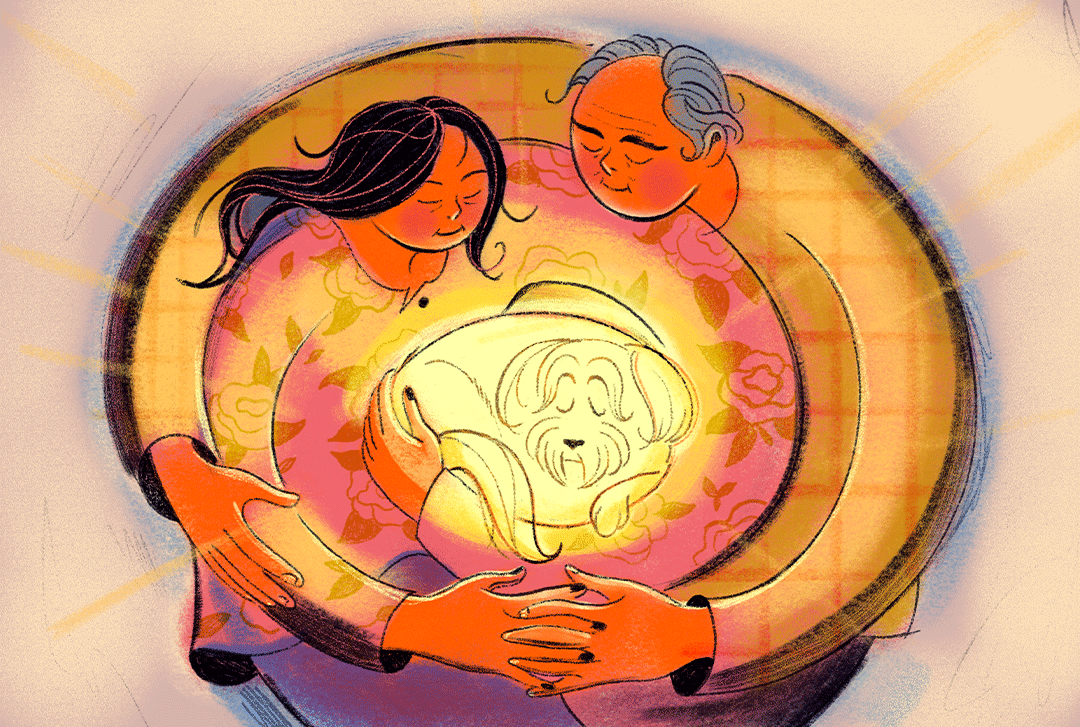L.A. Affairs: At 73, I fantasize about bisexuality. But what about my 50-year marriage?

- Share via
Marriages aren’t supposed to last 50 years. We promised “until death do us part” when I was 23 and my husband, John, was 24, but here we are at 73 and 74 respectively. Death hasn’t gotten around to us yet.
Once upon a time when marriage was invented, people died in their 40s or 50s. It was easier to live up to that forever promise. Just as my husband and I approached the 50-year mark, I began thinking there needed to be an escape clause. Couples who serve 50 years should be celebrated but also have the choice to be released from their vows.
In our case, John and I got through the seven-year itch and first decade with no problem. They were halcyon years and child-free. In our second decade, we had three kids and very little sleep. We moved around California— San Bernardino, San Francisco, Costa Mesa — taking turns at job opportunities as they came along.
L.A.’s dating scene wasn’t my thing. I had some not-so-memorable matchups. Despite being in a dark place, maybe this time would be different.
We had started with a plan: 50-50 sharing of housework and child care, separate bank accounts and occasional separate vacations. The plan worked pretty well for everything except child care. Corporations wanted 60 hours a week of his time, and the colleges where I worked were equally demanding.
“You said you’d be home by 7 p.m.,” I’d shout at him. “You said you’d do half of the child care!” We were angry at each other much of the time, and the walls of our homes bore scars. He punched a wall or two; I threw books and broke a window.
We talked divorce and saw therapists but never quite pulled the plug, perhaps because we’d grown up watching our respective parents fight but not divorce.
The worst years were the third and fourth decades of marriage. Our family history of addiction and mental illness showed up as the kids moved through their teens. Family therapy turned out to be more painful than couples therapy.
We had good jobs, however, and settled down in Santa Monica, where we found unity in facing disasters, both natural and unnatural: the Northridge earthquake, a small plane crashing into our backyard, and the murder of Nicole Brown Simpson after her daughter and ours had performed in a dance recital.
The fifth decade of marriage brought new tension. Retirement caused two people who had never had much time for each other to spend most of every day in the same house. The 45th president helped us through this shock by staging such a tumultuous four years that we found solace in reading newspapers, watching cable TV and venting to each other. Our politics have remained in sync despite our conflicts during the child-rearing years.
We coasted to a golden anniversary this month, but performing a flower-laden celebration wasn’t in the cards. Our kids know how rocky the road has been, and they were wary of any fake festivity. More than once they’ve asked, “Why didn’t you two get divorced?”
He was a white boy from Los Angeles. I was a Blerd from Queens, N.Y., and a lifelong Democrat. He was a registered Republican. We didn’t dwell on our differences — at first.
We’re lazy, for one thing. Dividing up the house, the money and the family looked daunting; the gains might not have outweighed the losses.
There are probably other couples who feel awkward about how to mark the surprising longevity of their marriage. Let’s get real about it. Couldn’t we just have a party and then shout, “Olly olly oxen free,” as we used to do when we were kids playing hide-and-seek?
What I’d like is an end to all the shoulds of being a couple, starting with permission to live apart from each other. I dream of getting a quiet apartment without basketball, baseball and ice hockey blaring on the flat-screen all day long, punctuated by John shouting, “Boom!” or “Yes!” I want to eat dinner together only once a week.
Maybe I would move to the south of France or Alaska. Being too far apart to sleep together occasionally would be OK because sex isn’t what it was in our 20s. We already sleep in separate bedrooms due to the legacy of CPAP machines, getting up in the night to pee, and long-term differences like whether to keep the blinds open at night. I want to see the moon and stars.
If I were single again, maybe I’d take a lover or be bisexual. Perhaps in the fashion of a medieval queen, I’d retire to a monastery.
The problem is that marriage in the sixth decade, like an insurance policy, starts to pay off. You have someone to drive you to and from your colonoscopy and other “procedures.”
Because you’re still in one house, your mortgage might be paid off. You might have enough money to take a cruise or do other travel — with a walker.
I became a dog dad and a husband. Does life get any sweeter?
Late in life, love is more complicated. It’s less driven by hormones and the magic of physical beauty. Comfort and familiarity are a big part of love in the 70s. We can talk about events and people from long ago without explaining.
John and I were a little edgy as the big date approached. We needed to do something but nothing too dramatic.
“Unless you have grander plans, maybe we could go out to dinner at that new place on 20th Street for our anniversary,” he said two weeks before the event.
“That restaurant where IHOP used to be?” I asked. “That’s a good idea.”
“The chef-owners are women and acclaimed.”
The perfect solution: dinner at Socalo, no kids, no extended family, no pressure.
Just the two of us, our memories and a few kisses.
The author taught literature and women’s studies at CSU Northridge and is now completing a memoir called “Off Track: Confessions of a Feminist Christian.” She’s on Instagram: @annelinstatter.
L.A. Affairs chronicles the search for romantic love in all its glorious expressions in the L.A. area, and we want to hear your true story. We pay $300 for a published essay. Email LAAffairs@latimes.com. You can find submission guidelines here. You can find past columns here.
More to Read
Sign up for The Wild
We’ll help you find the best places to hike, bike and run, as well as the perfect silent spots for meditation and yoga.
You may occasionally receive promotional content from the Los Angeles Times.













